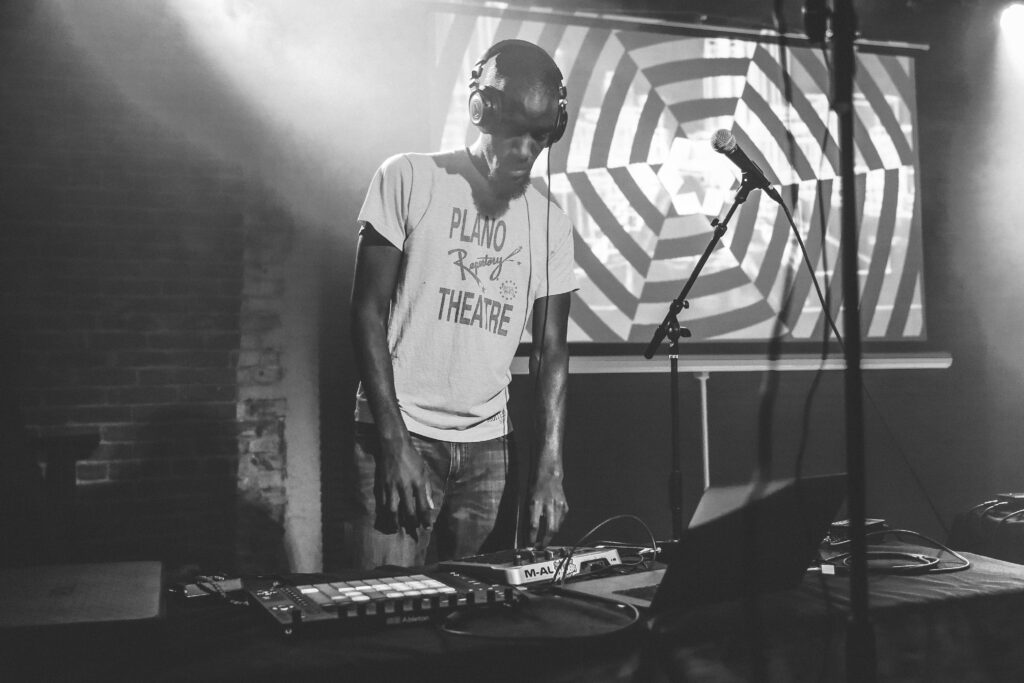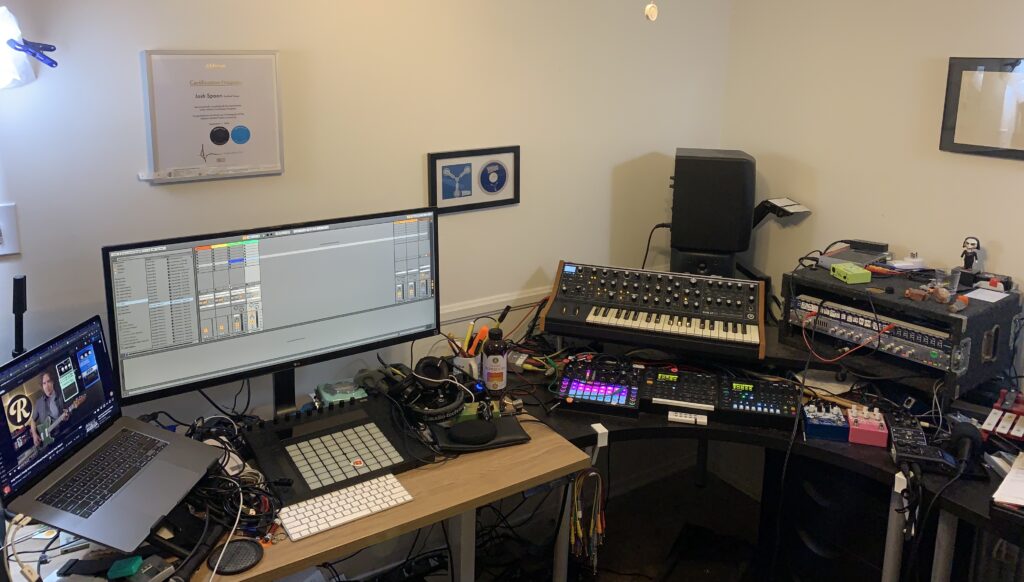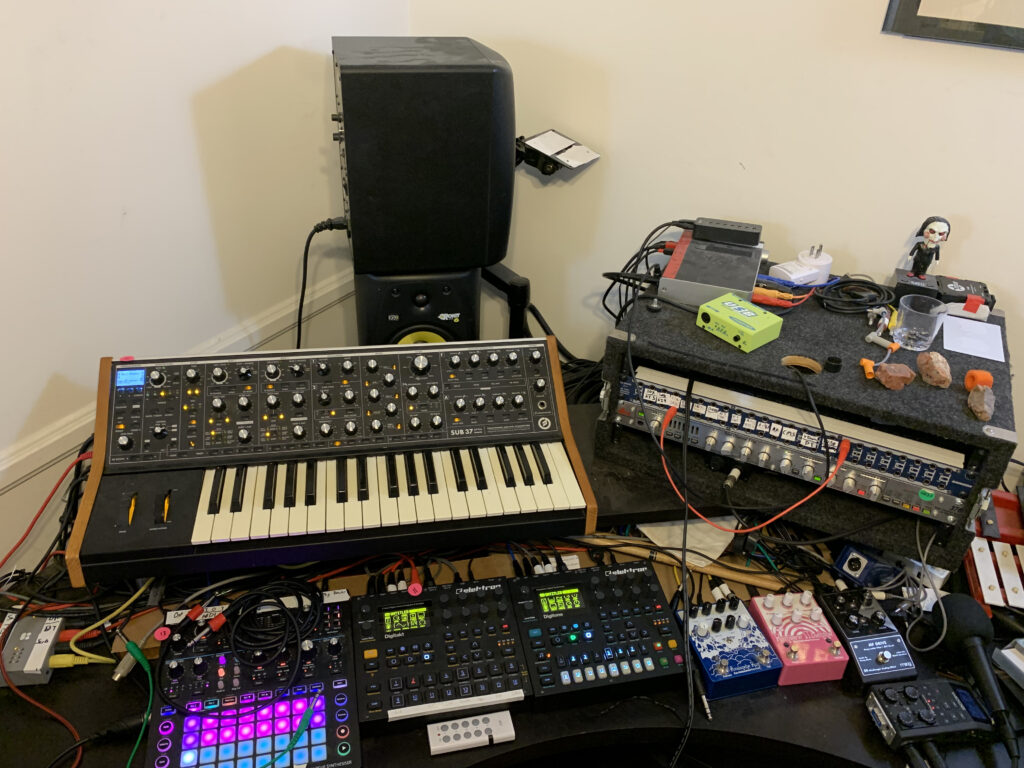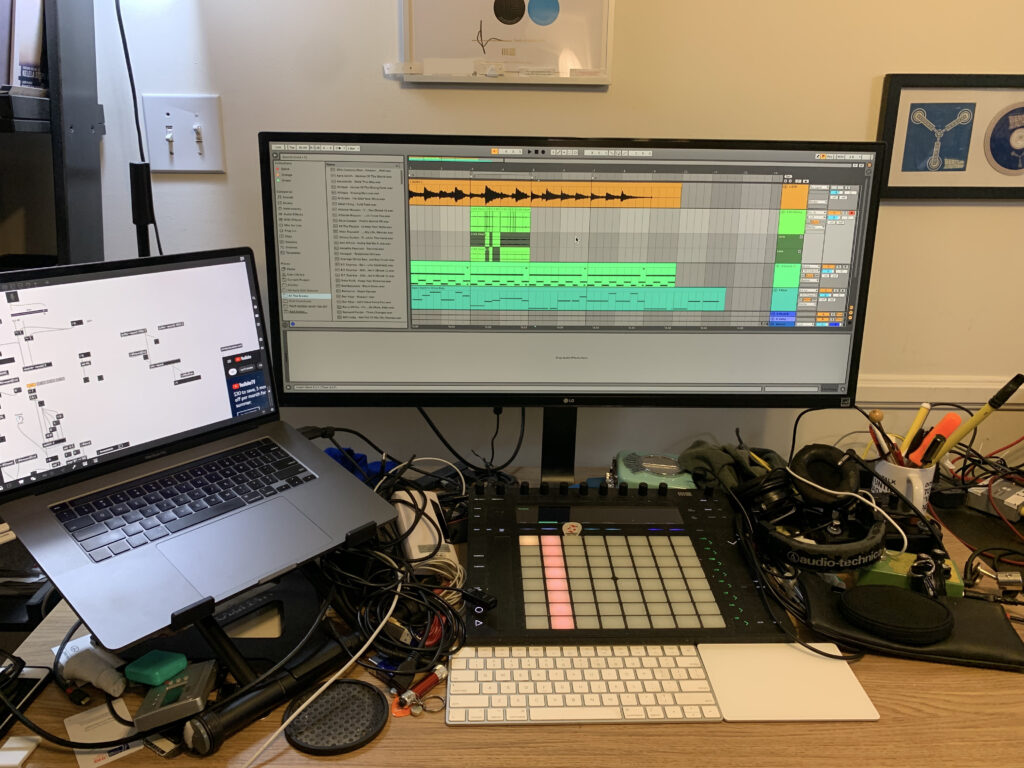Some electronic music producers only connect to their audiences through their work, but some like to expand this connection by sharing their knowledge with others. That is exactly what electronic music producer Josh Weatherspoon, who goes by the name Josh Spoon, does. While living and working in the USA, he shares his knowledge with creators from all around the globe, as he is Ableton Certified Trainer as well as a musician himself. Today we learn more about the creative journey of Josh Spoon and dive deeper into his mind as he shares his thoughts on music, producing, and knowledge itself.

Take a look at a short video introduction to Josh Spoon’s setup:
When and how did music come into your life? Did you always know you will be a musician, or was it an unexpected discovery?
My dad was in a gospel singing group that would tour different churches around New York. He still sings in his church choir. My mom played piano into her 20s, but I found that out about a year ago. That explains why my grandparents had a piano that I’d play the piano hook of LLCoolJ “I Need Love” on. In 3rd grade, I learned the recorder, as most kids do, and have a vivid memory of the analog metronome ticking in the music room window. I already had a good sense of rhythm at a young age. I’d attribute that to my parents playing all that soul, lite rock, and R&B while driving me around. The car is really where I learned music. Fast forward to me living in Texas. I joined the school band, playing saxophone and getting quite good before I quit to focus on basketball and playing drums in a local rock band. Once I saw the “Blackhole Sun” (Soundgarden) and “Rocket” (Smashing Pumpkins) videos, I knew I actually did want to be a musician. I’ve been making music one way or another ever since.
How would you describe your music style? Why did you decide to express yourself through electronic music, and what are your main influences?
That is the hardest question, isn’t it? I call it Transport Music. I make music to engulf myself and others with sound to take them to another place for the time they are listening. As an escape or just to build a world to experience it. Someone once said, “Your music is like The Flaming Lips meets Dr. Dre.” It’s one of the best compliments I’ve ever had, period. I’m a person who grows up on a steady diet of various music sources, expressing himself through the lens of electronic music.
I choose electronic music because it is limitless. Rock, Hip hop, jazz, etc. have a ton of rules. If you play with the wrong instrument or use the wrong sample, it’s not ‘real’ to a purist. I can mix whatever style and instruments I want, and if it’s interesting, it doesn’t matter too much.
My goodness, influences! If we are talking genres, I’d say hip hop, Rock, Funk, Lite Rock and various Jazz. If we are talking about artists, Beck for sure, he’s like the Mystique of music. MF DOOM, ATCQ, early Foo Fighters, Pantera, Smashing Pumpkins, JPEGMAFIA, Deftones, Yasim Bey, to name just a few.
What was the main reason you chose to include Midihub into your setup? How did it change your art?
I got Midihub because I was going headfirst into hardware, and I wanted a way to get them all to communicate without buying multiple pieces of gear. About a year prior, I bought an audio patchbay, and it helped me wrangle the audio routing, so I thought I needed something like that for MIDI.
I’m still working out the kinks for exactly how I want it to be, but it has helped me do some fun stuff like using my Digitakt or Volca Sampler as a poly synth, to name a few. But mostly, I use it in a practical setup. Sub 37 is the keyboard for all boxes, and my Digitakt is the clock for all boxes while the Midihub parses out info, so I don’t get MIDI feedback.
It helps create order that is consistent in my setup. It’s on all the time, and I know that when I fire up my gear, I just set the MIDI channel on my Sub 37 and get to work. When working with the computer, I don’t have to do anything with Midihub but switch it to Preset 2 for Live to be the clock while sending/receiving MIDI from everything else. It’s as easy as that.
We have noticed that you often share your performances online. What do you take into consideration while choosing the right platform? What are the pros and cons of sharing your art online?
I usually post on Instagram though I’m a little shy when it comes to the permanent record. I hold on to music longer than I should. When I do live shows, I’m fearless. When I do internet shows… I become hyper-aware. Same when I put out music on the major music sites. I do countless run-throughs, mixes, and tests.
In the past, I tried to make the best thing I could, so I’d spend hours making a 1-minute video, take after take after take. I then realized people aren’t as picky as me, and I am being hard on myself. People just wanted to see the art, even if it was a process. In the past, I’ve shared a lot of stuff that I thought sucked, but people were asking, “When are you going to put this out officially?” I would often stall and say it’s not ready, but people wanted it. I’m getting better… I think.
I like Instagram for quick ideas. I used to do standup, and I often miss the immediate satisfaction of hearing people laugh at a joke. In music, people can love your work, and you never hear that from them. Instagram gives me that feeling when I can post something and come back 20 minutes later and have some likes and quite a few solicitations for “get more followers” services. YouTube is more of a place to share fully thought out work, in my opinion. Though lately, I’ve been thinking, why not just post ideas too. Since the pandemic started and venues were shut down, people have asked me to perform live or record performances for YouTube. r/synthesizers on Reddit show me love, and I need to post more ideas there too.
The thing that has actually helped me not take sharing my art so seriously is that I can look back at what I posted and see it’s not as bad as I thought when I posted it and that I’m too hard on myself. I can also see the growth and the shifting of my work.
The downside of sharing online is when you really think something is great and because of algorithms or just people not liking it, you get little love. This can sometimes push me into the world of wanting to make things everyone will like. There is nothing wrong with that to a degree, but chasing trends is a dangerous drug. So I try to create work and let it sit for a while before I look at responses while also focusing on expressing myself more than looking at stats.
While being a musician, you are also an Ableton Certified Trainer. How and why did you decide to share your knowledge with others?
My mom is a retired teacher. My dad was a cop that does a ton of public speaking. My grandparents were Sunday school teachers, my uncle taught, my other uncle is Dean of Students at Exeter Academy, and was an Episcopal pastor. So I grew up with education, even when I didn’t want to. I would watch TV, and my mom was there on the couch with stacks of papers to grade. So sharing knowledge runs deep. I love knowledge, and many people invested in me on my musical journey.
I spent about every day in Ableton Live from 2008 to 2015 and noticed I knew more than most around me, and people started asking questions. I began doing presentations at the Dallas Ableton User Group back in the late 2000s. It came naturally because, at the time, I was mainly an Adobe Flash developer, so I always had to learn a lot of things to solve problems. I treated music like that once I started to learn Live. I poked at theory, gain staging, mixing, synthesis so I could get the music done myself.
With all the experimenting, I became good friends with Live, and I really thought if I share Live tips, I can get people to listen to my music. It sort of worked. I got bookings, but mainly people contacted me about lessons so they could make their music, and they had money, and the rent was not cheap once I moved to L.A. after turning my back on standup and programming to focus on music. Things picked up quickly, and then I did my “30 Days of Ableton Push” series. That sealed the deal with Ableton and many other people I work with now.
Could you please share some advice on using Ableton for electronic music production with those who consider trying it out?
Come to Live with an open mind. Yes, it’s not like most other DAWs. Yes, some other DAWs have Session Modes now, but most were not built that way from the ground up. Look at Live as a person who’s not like your other friends. One that is unique and you want to get to know better. Once you do, you will see Live is down for anything. You want to sit and chill; you want to go hiking; you want to jump out of a plane. Live is pretty much down for anything and mostly will not fight you on how you want to do it.
You can load house loops, one shots and instruments along with 64 lanes of different audio effects processing, with live video processing. All of that can be on just one track. Then you can automate all of that, just to name a few of the fun things it can do, but you can also just record yourself singing and playing guitar. It’s truly a crazy DAW.
Just play with it for a month. Every day. Pop in one earbud while watching TV. Just 30 minutes and play around. I have a student who started learning in his 70s, and he’s rocking it. It’s never too late or too hard to start. Read the manual on what confuses you, seriously, and watch the videos from Ableton’s YouTube. They will get you up on the basics fast. Maybe book a lesson or two with a knowledgeable friend or a CT. If you dig it, it will take you far creatively and maybe financially. That’s what I did.

Please share your future plans with us! Is there anything important we need to know?
My latest release, which I’m very proud of, Music 2 Float 2, inspired by my Onewheel journeys, is on Bandcamp but will soon be on Spotify, Apple, and the rest. Be on the lookout for that. I’m always working on sound packs for myself but I will do a Digitone one soon. Check out my tutorials on The Producer’s Kitchen or search “Josh Spoon”. There’s a decent amount of information about my educational side. If you made it all the way through this Q&A., thanks!
Follow Josh Spoon
Official WebsiteBandcamp
Production Tutorials
Ableton One Thing

